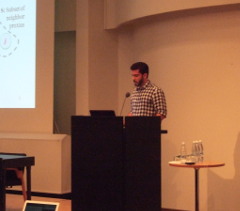Ph.D. defense by Xenofon Vasilakos
27-02-2017
Xenofon Vasilakos will present his Ph.D. thesis on Wednesday, March 1st, 11:00AM EET, at Teleconference & e-learning room, 4th floor, Antoniadou section, central building complex of the Athens University of Economics and Business. Title and abstract follow.
Title: Mobility-based Proactive Caching Models for Addressing Niche Mobile Demand and Scalable ICN Name Resolution Designs
Abstract: Since its original conception, the Internet has undergone a series of radical technological breakthroughs and usage expansions. From the perspective of its users, it is a global framework for sharing information among millions of fixed and mobile users. However, its legacy architecture poses serious functionality limitations or inefficiencies to information sharing & retrieval. At the same time, the patched mobility support over the legacy architecture and even the intrinsic mobility support of Future Internet architectures that adapt the Information-Centric Networking (ICN) paradigm are not enough to sufficiently address the Quality-of-Service (QoS) requirements and the desired user-perceived Quality-of-Experience (QoE) levels in contemporary mobile application scenarios. The former problems get further aggravated by the unprecedented and continuously increasing numbers of the different Information Objects (IOs) and mobile devices in the Internet, as well as the corresponding high content resolution traffic and mobile traffic volumes.
The main contribution of this thesis lies in the design of efficient proactive caching models for enhancing seamless mobility that run at the application layer of any underlying network architecture or within the network layer of ICN architectures. Our main model regards an Efficient Mobility-based Caching (EMC) scheme for addressing niche mobile demand along with popularity-based and legacy caching model extensions.
Opposite to other proactive solutions, which focus exclusively on popular content, our proposed distributed design targets less popular or personalised content requests by prefetching and caching the desired information locally in small cells based on aggregated user mobility prediction information and a local cache congestion pricing scheme. Such niche demand, particularly for video content, represents a significant 20–40% of demand in the Internet and follows a growing trend. Due to its novel design, EMC can directly address niche demand and get easily extended to make a joint use of content popularity information with the novelty of dynamically balancing the influence of mobility prediction and content popularity information on local cache actions. Based on thorough performance evaluation simulations for exploring different demand levels, video catalogues and mobility scenarios, including human walking and automobile mobility, we show that the gains from mobility prediction can be high and able to adapt well to temporal locality due to the localised and short timescale character of the exploited mobility prediction measurements, exceeding cache gains from popularity-only caching. Moreover, the performance of our model can be further improved by adapting cache replacements at the cost of an added computational overhead.
Additionally, this thesis makes a contribution towards a feasible and globally scalable ICN Name Resolution System (NRS) to facilitate information sharing & retrieval in ICN. The contribution lies in certain design and performance aspects related to the structure of the underlying inter-domain topology in the Internet and specifically to a) the design of the hierarchical overlay routing mechanism that underlies the Distributed Hash Table-based Name Resolution System (DHT-NRS) and b) a thorough performance quantification study of DHT-NRS and other cutting-edge ICN NRSs with respect to load distribution and routing policy compliance across the Internet topology.